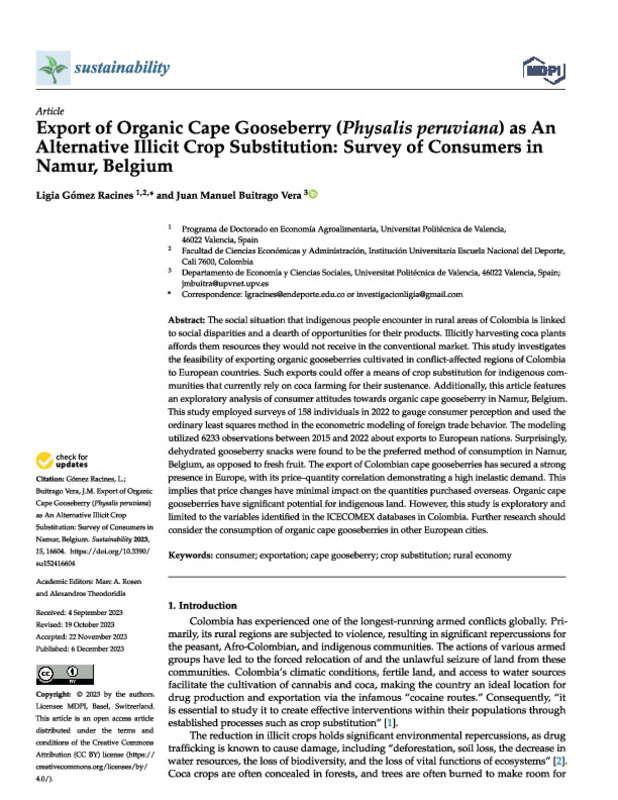JavaScript is disabled for your browser. Some features of this site may not work without it.
Buscar en RiuNet
Listar
Mi cuenta
Estadísticas
Ayuda RiuNet
Admin. UPV
Export of Organic Cape Gooseberry (Physalis peruviana) as An Alternative Illicit Crop Substitution: Survey of Consumers in Namur, Belgium
Mostrar el registro sencillo del ítem
Ficheros en el ítem
| dc.contributor.author | Gómez Racines, Ligia
|
es_ES |
| dc.contributor.author | Buitrago Vera, Juan Manuel
|
es_ES |
| dc.date.accessioned | 2024-02-26T19:02:18Z | |
| dc.date.available | 2024-02-26T19:02:18Z | |
| dc.date.issued | 2023-12 | es_ES |
| dc.identifier.uri | http://hdl.handle.net/10251/202769 | |
| dc.description.abstract | [EN] The social situation that indigenous people encounter in rural areas of Colombia is linked to social disparities and a dearth of opportunities for their products. Illicitly harvesting coca plants affords them resources they would not receive in the conventional market. This study investigates the feasibility of exporting organic gooseberries cultivated in conflict-affected regions of Colombia to European countries. Such exports could offer a means of crop substitution for indigenous communities that currently rely on coca farming for their sustenance. Additionally, this article features an exploratory analysis of consumer attitudes towards organic cape gooseberry in Namur, Belgium. This study employed surveys of 158 individuals in 2022 to gauge consumer perception and used the ordinary least squares method in the econometric modeling of foreign trade behavior. The modeling utilized 6233 observations between 2015 and 2022 about exports to European nations. Surprisingly, dehydrated gooseberry snacks were found to be the preferred method of consumption in Namur, Belgium, as opposed to fresh fruit. The export of Colombian cape gooseberries has secured a strong presence in Europe, with its price-quantity correlation demonstrating a high inelastic demand. This implies that price changes have minimal impact on the quantities purchased overseas. Organic cape gooseberries have significant potential for indigenous land. However, this study is exploratory and limited to the variables identified in the ICECOMEX databases in Colombia. Further research should consider the consumption of organic cape gooseberries in other European cities. | es_ES |
| dc.language | Inglés | es_ES |
| dc.publisher | MDPI AG | es_ES |
| dc.relation.ispartof | Sustainability | es_ES |
| dc.rights | Reconocimiento (by) | es_ES |
| dc.subject | Consumer | es_ES |
| dc.subject | Exportation | es_ES |
| dc.subject | Cape gooseberry: Crop substitution | es_ES |
| dc.subject | Rural economy | es_ES |
| dc.subject.classification | ECONOMIA, SOCIOLOGIA Y POLITICA AGRARIA | es_ES |
| dc.title | Export of Organic Cape Gooseberry (Physalis peruviana) as An Alternative Illicit Crop Substitution: Survey of Consumers in Namur, Belgium | es_ES |
| dc.type | Artículo | es_ES |
| dc.identifier.doi | 10.3390/su152416604 | es_ES |
| dc.rights.accessRights | Abierto | es_ES |
| dc.contributor.affiliation | Universitat Politècnica de València. Escuela Técnica Superior de Ingeniería Agronómica y del Medio Natural - Escola Tècnica Superior d'Enginyeria Agronòmica i del Medi Natural | es_ES |
| dc.description.bibliographicCitation | Gómez Racines, L.; Buitrago Vera, JM. (2023). Export of Organic Cape Gooseberry (Physalis peruviana) as An Alternative Illicit Crop Substitution: Survey of Consumers in Namur, Belgium. Sustainability. 15(24). https://doi.org/10.3390/su152416604 | es_ES |
| dc.description.accrualMethod | S | es_ES |
| dc.relation.publisherversion | https://doi.org/10.3390/su152416604 | es_ES |
| dc.type.version | info:eu-repo/semantics/publishedVersion | es_ES |
| dc.description.volume | 15 | es_ES |
| dc.description.issue | 24 | es_ES |
| dc.identifier.eissn | 2071-1050 | es_ES |
| dc.relation.pasarela | S\507997 | es_ES |
| dc.contributor.funder | Universitat Politècnica de València | es_ES |
| dc.subject.ods | 08.- Fomentar el crecimiento económico sostenido, inclusivo y sostenible, el empleo pleno y productivo, y el trabajo decente para todos | es_ES |
| upv.costeAPC | 2783 | es_ES |








